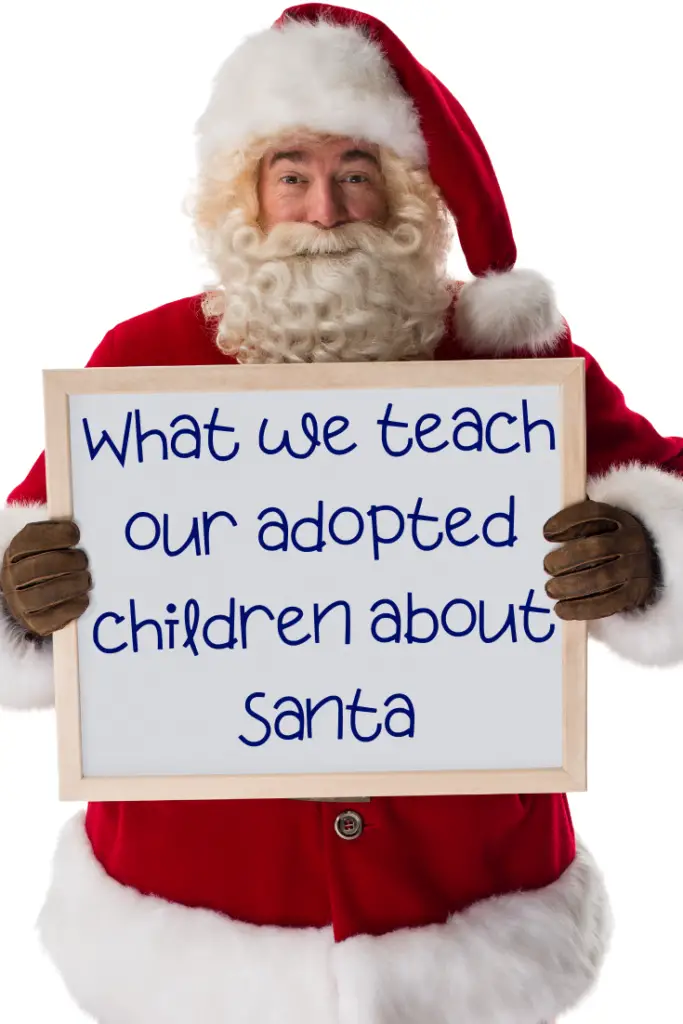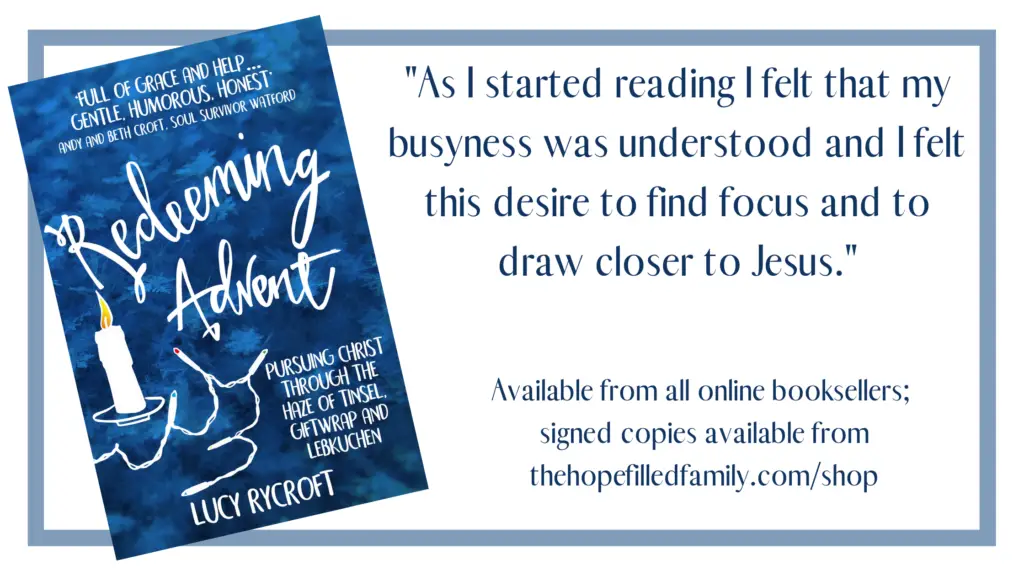I use affiliate links in some blog posts. If you click through and make a purchase, I earn a small commission at no extra cost to yourself. Thank you for your support.
I never formulated my ideas about Santa because of our adopted children, in case any of you think I’m more thoughtful about these kinds of things than I actually am.
As a child, I enjoyed writing to Santa, sending my letter up the chimney of our open fire by making a draught with the door (a difficult feat, but I remember at least one occasion when we managed it!), and – of course – leaving out my stocking on Christmas Eve.
But I don’t remember believing he was real.
It didn’t spoil the fun for me. Or maybe it did – who knows? I have nothing to compare it with. All I know is that I enjoyed Santa at Christmas, but always knew that what we were really celebrating was God-made-man, the coming of our Saviour Jesus Christ as a tiny, fragile baby.
I got small, fun gifts in my stocking – from ‘Santa’ – but larger gifts appeared under the tree throughout December, and were from family. They all had labels, and I knew who to thank.
I always assumed I would do the same for my children – so, if I’m honest, I hadn’t really given it much deeper thought than this.
But when my son was very small, and a friend mentioned the idea of teaching Santa as St Nicholas, my heart skipped a beat. Here was something I could really grab hold of with my children: teaching that Santa was a real person, a godly man called Nicholas who loved and gave self-sacrificially to the community around him – not unlike Jesus.
We would also – obviously – teach that Nicholas lived and died a long time ago, but now that he’s with Jesus, we remember him through involving Santa in our Christmas celebrations.

This has been our stance as we’ve raised all our children (and you can read more about it in my book Redeeming Advent), but I think it’s been particularly helpful for our adopted boys, who we welcomed into our family four years ago. There are several reasons why this way of including Santa but not encouraging belief in him has worked for our sons:
Santa only comes if you’ve been good
Whilst I imagine no family ever withholds gifts from their children on the basis of their behaviour, we certainly talk about it a lot through November and December as a way of encouraging ‘good’ decisions.
But for a child who has had changes in caregiver, chances are they’re already feeling pretty shamed. Whatever the head says, the heart still feels that there must be something ‘unloveable’ about them, something inherently bad which kept their birth parents from being able to look after them adequately.
As Dr Sue Armstrong-Jones, chief executive of Adoption UK, says:
“The all-pervasive mantra of being nice rather than naughty as a guarantee of good things just erodes the already shattered self-esteem of children, who believe they are unworthy of love because they didn’t receive wholesome love in their early years.”
Last December we were at the dentist, when one of the receptionists got down to my sons’ level and started asking if they’d been good and saying that Santa would come if so.
I stood frozen to the spot – and have since regretted a thousand times that I didn’t say something to reassure them. I felt so cross that someone who didn’t know my sons was talking with them about good and bad behaviour. How could she possibly know what was going on inside them?!
My children don’t need another reminder that they might possibly be ‘too bad’ for a grown-up to fulfil a duty to them. They’ve already lost birth parents who couldn’t care for them. As adoptive parents our job is to nurture their self-esteem so that they begin to feel and know that their birth parents’ mistakes were nothing to do with them. Plonking Santa into the end of their year in a way which is based around behaviour isn’t conducive to this.

Santa won’t last forever
My children need stability, and they need truth. They need us to be totally honest with them about their birth family and the circumstances which brought them into care.
If we teach them that Santa is real, and then a few years down the line they discover that he’s not, what’s to say that we’ve been lying to them about their birth family too?
Perhaps this sounds harsh. Perhaps you remember your own realisation about Santa being a fairly manageable rite of passage. Perhaps you’re expecting that your children will also manage it well – and maybe they will.
Each child is different, and I can’t tell you what to do with your own child.
I’m not here to judge – I’m simply here to tell you what we do and why. Perhaps, for your children, it’s best that they’re allowed to believe.
But for our children, no. They need very clear statements and boundaries, and they need to know where they stand. Meerkat gets very anxious around changes and transitions. It’s for his benefit that we share about Santa being the way we remember St Nick – who definitely WAS real and who, in turn, points us to Jesus.
(Ironically – I’ve found that some of my children actually make themselves believe in Santa, even when we’ve told them the truth! I’ve mulled over why this might be, and come to the conclusion that there’s nothing we can do to stop them creating their own stories and games – however, for our part, we will always tell them the truth.)
Santa has no substance
As Christians, we believe that, at the root of all of us – adopted or not – there is a need for a relationship with God.
Yes, we try and use therapeutic parenting techniques. Yes, we access therapy when it’s available for our children. Yes, we work with our children’s teachers on strategies and approaches when needed.
Being people of faith doesn’t mean we shun every avenue of practical help open to us.
But at the heart of the human condition is the problem of sin. Our children bear the sins of their parents – birth and adoptive – and the sins of themselves. It is the reason none of us functions as we want to. It is the reason our boys’ birth parents couldn’t keep them. It is the reason we struggle in parenting.
There is great hope, however, for those of us who trust in Jesus. He has taken these sins upon himself, taken the punishment in an excruciating death on a cross, and given us hope of a perfect, eternal life with God through rising to life, defeating death forever!
Santa can’t do this. Santa can’t heal our children’s hurts. Santa can’t forgive them, their birth parents or us. Santa can’t fulfil their longing for intimacy with Father God. Santa doesn’t actually love our children, because he doesn’t actually exist.

The real deal
Many things will help our children grow into happy, well-adjusted adults, but at the centre of it all is an awareness of themselves as God’s created, much-loved children. Knowing that God is extending His hand of love and grace to us and our children, without exception and without condition, is the start of our children’s healing.
Santa, without St Nick, offers us nothing of substance. It’s really fun to play the game, to pretend he’s filled our stockings, to enjoy the films where no one believes in Santa but then he appears and they start to believe in him!
But in terms of who we’re celebrating this Christmas – it’s got to be Jesus. And St Nick points us to him.
For children who have been let down by those who were supposed to build them up, I can’t run the risk that they will feel let down again when they realise that Santa isn’t real.
So, as for me and my household, we will celebrate the fun of Santa – the letters, the stockings, the grotto at school.
And, as we do so, we will remember St Nicholas, our wise, generous ancestor who had so little yet gave so much.
And, as we remember St Nicholas, we will worship Jesus, who had nothing yet gave us all we ever needed.
***
(Check out the book we use to teach about St Nicholas! It’s great from toddler age upwards. For primary-aged children this book is a bit wordier, but really great at linking the story of St Nick to the gospel.)
And don’t forget to look at my stocking filler ideas to nurture faith in under 5s, 5-8s and 8-11s.
Oh no, what a horrible experience at the dentist! I’m sure you did a great job reassuring him afterwards, but what a reminder of how vulnerable our adopted friends are to the thoughtless comments of strangers, even on something as innocuous as a trip to the dentist.
Once a woman on the bus reacted to Freddie having a tantrum by saying ‘Santa can see you.’ Now, I felt that was intrusive in itself, but if he were adopted I don’t know how I would have felt. I feel moved anew to pray for adopted children around this issue. Thank you! X
Aw poor you and poor Freddie 🙁 I think it’s difficult for all families who are trying to teach about grace and unconditional love, adopted or not. Xx
Lucy I’ve just re-read this post today following some difficulty one of my daughters has had with a conversation about FC with friends who believe and then me having to apologize to parents in case their daughters’ ‘magic ‘ has been spoilt …
I find being Christian parents sometimes so tough on our kids as we often have very different values compared to what feels to them like everyone else!
We have always treated Father Christmas in the way you outlined above as Jesus is the real deal! It also doesn’t sit comfortably with us to lie to our children. But then I get the impression that we might be judged by parents who have different values/emphases for Christmas.
So it’s good to know I and my children, are not alone! Thank you.
Ah yes, it can be so tricky can’t it? Big hugs for you all. You’re definitely not alone!